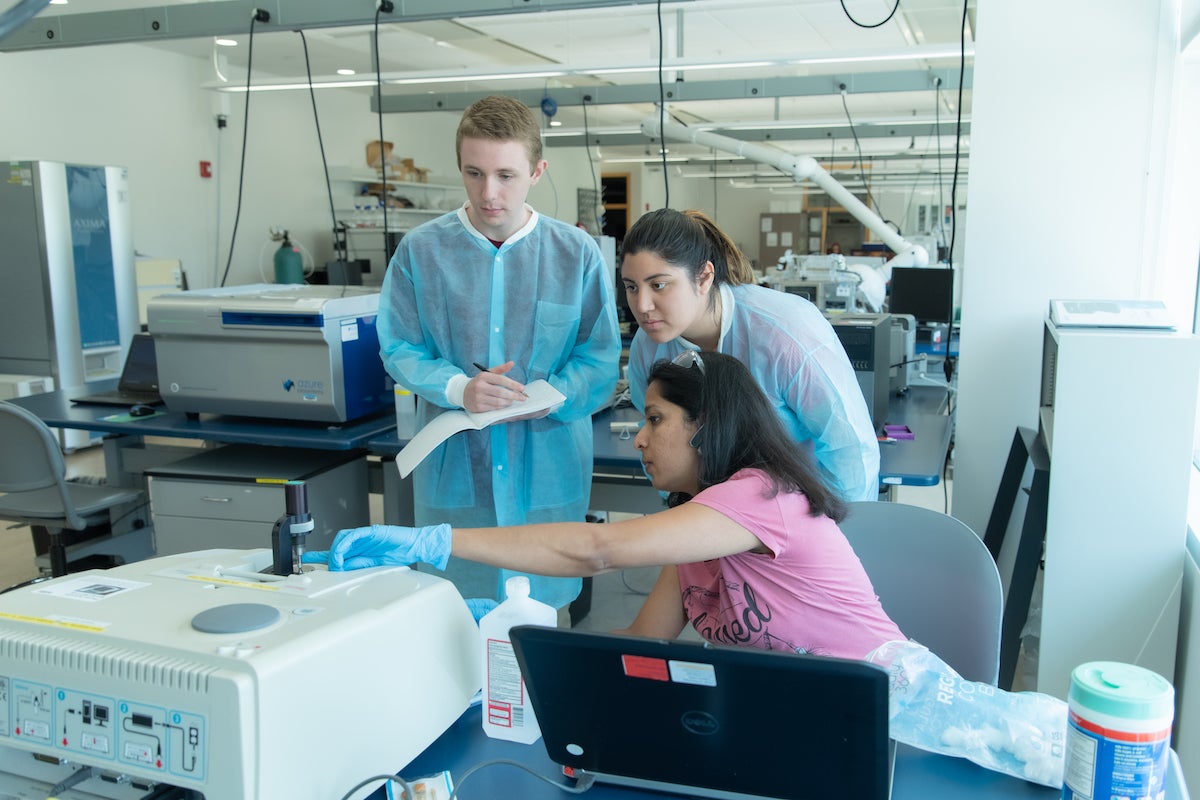RI-INBRE’s workforce development program, based on URI’s Kingston Campus, develops talent for biomedical, bioengineering, biomanufacturing industries
The Rhode Island IDeA Network of Biomedical Research Excellence (RI-INBRE) program will continue preparing students to be the next leaders in the state’s biotechnology industries after receiving renewed funding from the Rhode Island Department of Labor and Training.
RI-INBRE’s Workforce Development and Training program was created in 2023 to provide hands-on biomedical training for students in RI-INBRE’s well-equipped Centralized Research Core Facility on URI’s Kingston Campus. The program’s mission is to provide trainees with valuable biotech skills and to make those trainees preferred new hires for Rhode Island biotechnology industries once they graduate.
“Students learn different techniques and research methods working in their faculty mentor’s laboratory,” said INBRE Director and Pharmacy Professor Bongsup Cho. “They learn how to use the instruments and write and publish their research. The purpose is not necessarily to make them experts, but to give them an idea of what’s happening in these areas and with these research skillsets. After taking the modules, the students understand and appreciate these fields well. It takes the mystery out of biomedical research.”
The program is supported with $223,875 in funding for the 2024-25 academic year, part of the Real Jobs RI program, raising its total funding to more than $600,000. Expert faculty and staff at URI design and conduct 14 intensive 2.5-day training modules for small groups of trainees, allowing instructors to provide individual attention for each participant. Students in chemical, biological, bioengineering, and other health sciences are encouraged to apply here. Currently, the program is open to students at the nine colleges and universities in the state that partner with RI-INBRE, funded by federal National Institutes of Health grants. However, Cho hopes to expand the program to include training modules for existing biotech employees.
“As part of the so-called ‘URI B3 initiative’—Biomedical, Bioengineering and Biomanufacturing—we are at the forefront of workforce development in this area,” Cho said. “In the first year, we trained 67 future biotech employees. We are expanding our workforce development to be more impactful and more general, not just limited to biomedical skills. This year, we are including biomanufacturing and bioengineering. We hope to set a model for others to follow—how the university, state and federal programs can work together.”
Thanks to the state DLT, all modules are offered free of charge and provide instruction on the theory and practice of operating molecular and cellular analysis equipment, as well as training in scientific methods and data analysis. Courses include chromatography, cell and tissue culture, DNA manipulation, fluorescence microscopy, worm model neurobiology, and more. Students also learn basic lab techniques, which Cho said is valuable to prospective employers. Participants who complete a training module earn a RI-INBRE-branded certificate.
The RI-INBRE program, a statewide network, is a cornerstone in building the biomedical research capacity of Rhode Island institutions. Over the past 23 years, it has expanded its scope from basic biology, chemical and pharmaceutical sciences to include engineering, nursing, data science, behavior, and other health sciences. This expansion has led to increased research funding, bringing more than $81 million to Rhode Island for biomedical research capacity. The program has applied for $22 million to support the next five years, and is awaiting a decision from NIH.
“If we are successful, we’ll have more than $100 million in biomedical capacity in Rhode Island, which is really something to celebrate,” Cho said. “We’re really expanding the footprint. The RI-INBRE program has become one-of-a-kind in Rhode Island. I cannot think of any grant that goes on for 20-something years and makes this much impact.”

